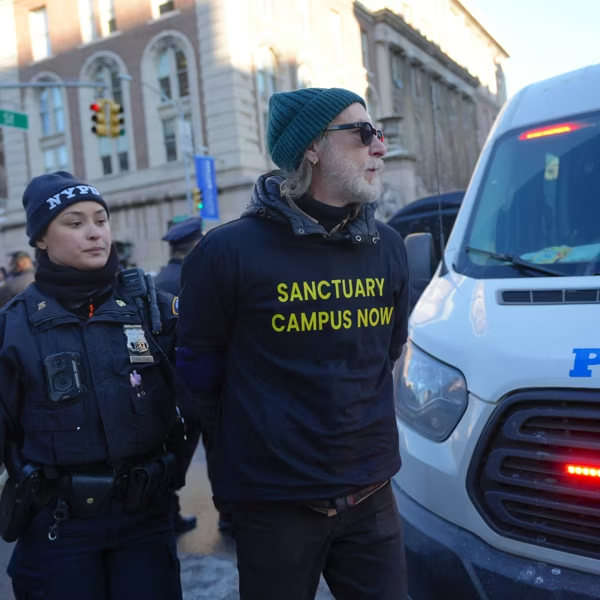Columbia University on Monday announced that it would divest from the private prison industry and ban reinvestment in companies that operate prisons, making it the first college to cut ties with a system that student activists say is racist, exploitative, and unjust.
The announcement follows 16 months of campaigning by the prison abolitionist group Students Against Mass Incarceration, which launched after a number of students discovered in 2013 that the school had invested roughly $10 million of its endowment in the Corrections Corporation of America (CCA) and G4S, two for-profit companies that operate private detention centers and prisons around the world.
G4S is the largest private security firm in the world. CCA is the largest private prison company in the U.S. Both have long histories of human rights abuses against prisoners and have lobbied in favor of draconian legislation like mandatory minimum sentencing and Arizona's infamous SB1070 statute.
"We targeted the university's investments in two private prison companies, but we hope that private prison divestment campaigns, with the abolitionist vision of a larger anti-prison movement, can help us start working towards divesting from the idea that prisons equal justice, which we believe to be fundamentally racist," said one organizer, Dunni Oduyemi.
"These companies have a fundamental interest in expanding incarceration in order to maximize profit. We will not see an end to the racism and exploitation embedded in our contemporary systems of mass incarceration and detention if we do not dismantle the economic engines of this prison-industrial complex," said Gabriela Catalina Pelsinger, another student organizer.
"[P]art of the power of the prison divestment movement is in its potential to build coalitions across multiple movements that advocate for racial and economic justice," Pelsinger told Common Dreams. "The companies we target have become billion dollar corporations because their business models depend entirely on the implementation and continuation of laws and practices that allow them to warehouse as many people for as long of a time as possible."
Asha Rosa, a core organizer of the divestment campaign, said much of the work involved on-campus actions, political education, and meetings with university committees that were put in place as bureaucratic roadblocks to student activism.
"We used all these different channels to hold the university accountable to its internal policies," Rosa told Common Dreams. Overcoming those obstacles required "a lot of determination and endurance" from the students involved in the campaign, she said.
The divestment campaign, which launched in February 2014, also connects the prison industry to the larger issues of state violence and anti-black racism, drawing on the work of the Black Lives Matter movement and the anti-gentrification efforts in West Harlem, where Columbia is located.
"The roots of these systems are all tied up in the legacy of Jim Crow, the legacy of slavery, and anti-black racism," Rosa continued. "We're trying to re-frame [investment in the prison industry] as part of the larger movement of criminalization of black and brown bodies."
The campaign also asks Columbia students to "recognize the privilege that comes with being a student at an elite university... and acknowledge our complicity in a complex system" that perpetuates institutional inequality, Rosa said.
In a statement, organizers explained that the "racist, classist images of 'criminals deserving of punishment' are created in tandem with images of 'hard-working college students deserving of opportunity,' and each is defined in relation to the other... [w]e refuse to buy into the false narratives that justify our privilege at the expense of the suffering of others."
Lou Downey, an organizer with the Stop Mass Incarceration Network, told Common Dreams that the students "are standing up refusing to be complicit with inhumane private prisons. But it's even beyond private prisons and prison profit-making. These horrors are felt in the whole U.S. mass incarceration system from Rikers Island to Pelican Bay. There is a program of criminalizing millions of Black and Brown youth whom this system can offer no future while at the same time, fears could be at the center of rising up against America's injustices."
Rosa added that it is important not to treat the announcement like a "victory moment for Columbia."
The school is still involved in the system of inequality through other means, Rosa said, like the on-campus racial profiling of black students and the push for sprawling gentrification in West Harlem. With gentrification comes displacement, heavy policing, and criminalization of marginalized communities, she said.
She said that rather than seeing the divestment as a conclusive triumph, the focus should be on continued efforts to divest from all systems of inequality—not just prisons. "This is a moment of pressure."



